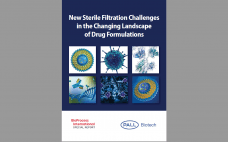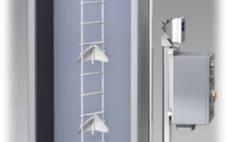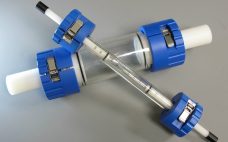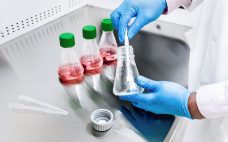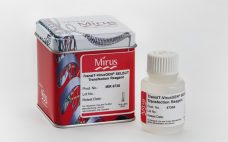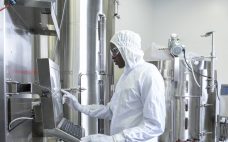The Gibco™ CTS™ LV-MAX™ Lentiviral Production System provides a scalable and high-yield lentiviral vector (LV) production platform. It is based on a high-density suspension culture of HEK293Fāderived Viral Production Cells that have been optimized for viral production in chemically defined LV-MAX Production Medium. Scalable LV production of greater than 1 x 10āø TU/mL LV (unconcentrated) can be achieved using our proprietary lipid nanoparticle transfection reagent in combination with an LV-specific enhancer and production supplement. All components work synergistically to help…
Sponsored Content
Drug Formulations Are Changing:
New Sterile Filtration Challenges in the Changing Landscape of Drug Formulations
Read about the challenges of sterile filtration of high concentration mAbs, liposomes, and lentiviral vectors, and how to solve them in this Special Report. Development of new, complex drug formulations has given us therapeutics with properties that are markedly different from traditional drug types. High viscosity or low surface tension formulations or large viral vector molecules can mean that sterile filtration processes, which are optimized for traditional drug types, are not as efficient for the new, complex formulations. Premature filter…
Technology Transfers – A Beginnerās Guide
Pharmaceutical developers are increasingly relying on external manufacturing partners for expertise to develop and commercialize their products. In fact, contract development and manufacturing organizations (CDMOs) now process and manufacture approximately 28 percent of the worldās prescription and non-prescription drugs. Innovation is coming from all corners of pharma including independent labs, scientific consortia, academia and government programs. These emerging sources of drug innovation often have excellent science but few resources and a lack of experience in commercializing formulations and drug product…
Bioprocess Selection and Economics: 5,000-L DynaDrive™ Bioreactor Shifting the Paradigm
This webcast features: Jeff Johnson, Founder and President, BioTech Design, LLC, Mark Thomas Smith, R&D Engineer, Thermo Fisher Scientific, and Kevin Mullen, Senior Product Manager, Thermo Fisher Scientific Single-use technologies enable a flexibility and modularity effectively unattainable with more traditional stainless-steel technologies, particularly in upstream bioprocesses. Single-use bioreactors up to 2,000 L are employed largely in preclinical- and clinical-stage bioprocesses to leverage this flexibility. As products reach commercial maturity, scales larger than 2,000 L frequently become desirable to take advantage…
Future Proof Your HCP Strategy
Future proof your HCP strategy. Four questions to help you decide if your HCP analysis data is ready for next phase approval. Host cell proteins (HCPs) are a primary source of impurities in biologics development. Scientists must detect and remove HCPs to ensure patient safety and meet regulatory guidelines. If previously undetected HCPs are found in later phases of clinical trials, scientists will need to redesign the drug substance purification strategy ā adding financial and time costs that can create…
FPLC Column Selection Considerations
This webcast features: Dan Yukon, Head of North American Sales and Global Sales of SNAP Products, Astrea Bioseparations This presentation will outline various selection criteria when considering glass fast protein liquid chromatography (FPLC) columns for low-pressure chromatography. The topics will include: pressure and volume considerations column configuration (aspect ratio) materials of construction frit type, design porosity, and mounting connection types adjustability construction accuracy packing tube design storage. There are many types and brands of columns available on the market, and…
Revealing Cell Secrets with Optical Sensors in Upstream Bioprocessing
This webcast features: Jake Boy, Senior Application Scientist, Scientific Bioprocessing Single-use optical sensors play a critical role in upstream bioprocessing. Scientific Bioprocessing has developed sensors with a form factor suitable for the smallest culture vessels so that data can be obtained from the very early stages of research through scale-up in larger reactors. Our intelligent, dynamic, and real-time monitoring of pH and dissolved oxygen challenges traditional culture protocol assumptions and offers insights into the conditions that cells are actually experiencing.…
Accelerate Cell and Gene Therapy Development and Increase Manufacturing Capacity with Higher Titer LV and AAV Transfection Platforms
This webcast features:Ā Leisha Kopp, Applications Scientist, Mirus Bio Cell and gene therapies show unparalleled promise to improve the human condition by eradicating cancer and rectifying genetic disorders. However, low viral titers and capacity constraints in viral vector manufacturing processes can dramatically hinder the progress of these transformative therapies. TheĀ TransIT-VirusGENĀ® Transfection Reagent from Mirus Bio offers a simplified, cost-effective workflow for recombinant lentivirus (LV) and adenoassociated virus (AAV) generation.Ā TransIT-VirusGEN Transfection Reagent is also effective in both adherent and suspension HEK 293āderived…
Single-Use Technologies: Innovation and Performance
The biotherapeutic market has been rapidly adopting single-use technologies to reduce risk and improve operational efficiencies. For more than 20 years, Thermo Fisher Scientific has pioneered single-use technologies for this industry. Our products have been proven to be robust and scalable from laboratory scale-up to current good manufacturing practice (cGMP) production applications, including single-use bioprocessing equipment, flexible containment, and rigid containment product portfolios. Our webinars will explore data, innovative products, and novel strategies featuring single-use solutions for the bioprocessing market.…
ELEVECTA ā The future of AAV gene therapy vector production
Pharmaceutical companies with gene therapies in their pipeline need to establish scalable production processes that can keep up with the increasing demand in terms of volume, quality and robustness, says CEVEC. Gene therapies are seen as one of the most promising approach to treat life-threatening diseases with no therapeutic options and high medical needs.Ā In addition, gene therapies are now advancing also into indications with larger numbers of patients, including Alzheimerās and Parkinsonās, thereby dramatically increasing the demand for viral…


